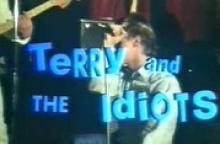Assembling random grainy footage doesn’t always make for a great film – even in retrospect.
The most enjoyable moments from Lech Kowalski’s first foray into the realm of feature length documentaries, the 1980 film D.O.A. suffers as a result of it covering the subject matter which makes it interesting. There can’t have been too much help in getting materials and travel expenses arranged for Kowalski and what appears to be a relatively hefty crew for such a film.
By the time the film began shooting in 1978, it could be argued that punk was already done for. Most of its ‘stars’ were attached to major labels (the Clash and the focus of this film, the Sex Pistols). So, in some ways, D.O.A. really functions as nothing more than a detailing of the Pistols seven dates here in the States.
Surely, there’s footage from a few other bands – Terry and the Idiots, an inept Brit band who wouldn’t have ever been registered in history if not for this documentary. But some footage of the X Ray Spex is entertaining as Kowalski is able to cut from a performance in a practice space to a live show without the viewer realizing what’s happened until the camera pulls out.
Roughly the same technique is used for a few other portions of the movie. It doesn’t work at all when levied upon a brief performance by Cleveland’s the Dead Boys. Even the audio during the performance is lifted from the group’s album as opposed to be live.
The edits are at times nothing short of jarring. And when documenting the Pistols last performance in the States, which would actually wind up being its last performance until reformed in the nineties, splicing together various live shows doesn’t serve the whole. People are playing their instruments on screen while audible in the soundtrack and vice versa.
It was an early effort from this filmmaker, though. So, as long as the same missteps weren’t prevalent again and again in later work, no harm done.
Folks might find a great deal of this work relatively boring if not great fans of the bands documented, but seeing ‘punks’ from the seventies explain why the Pistols were good or bad is entertaining. Having Sid and Nancy nod off repeatedly on camera is a bit less fun, but again, a useful historical document that the world might be able to function without. But at least its here for the watching.
